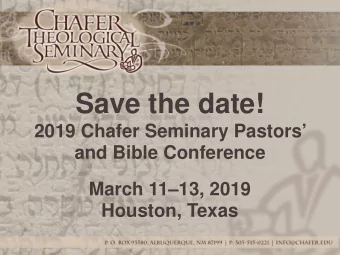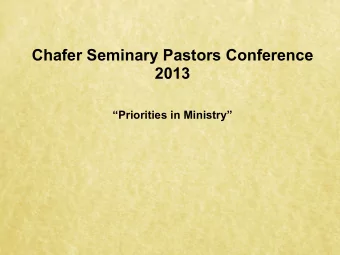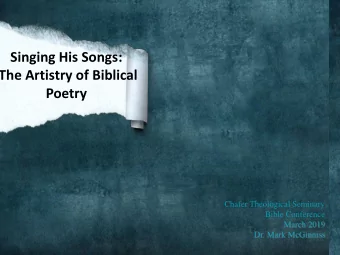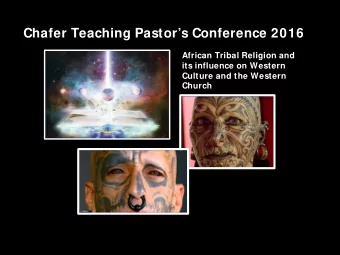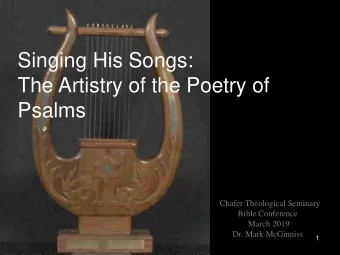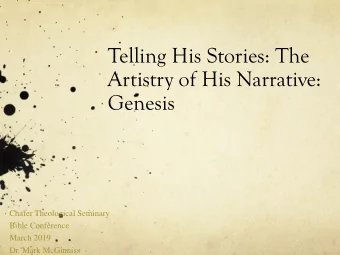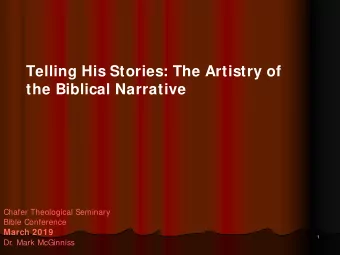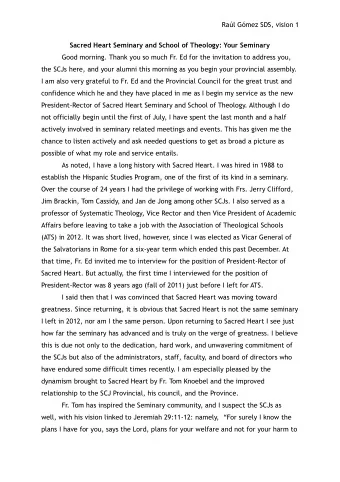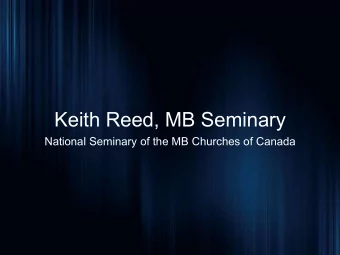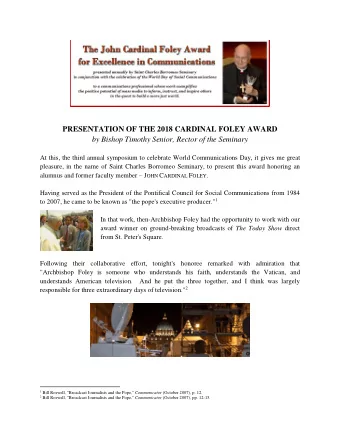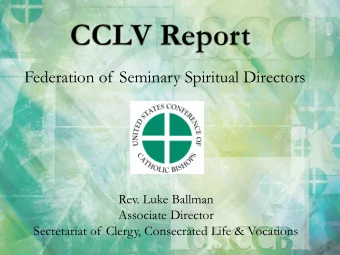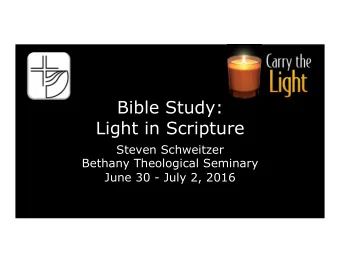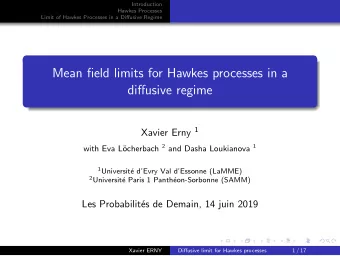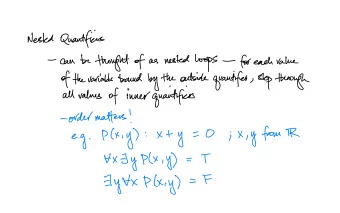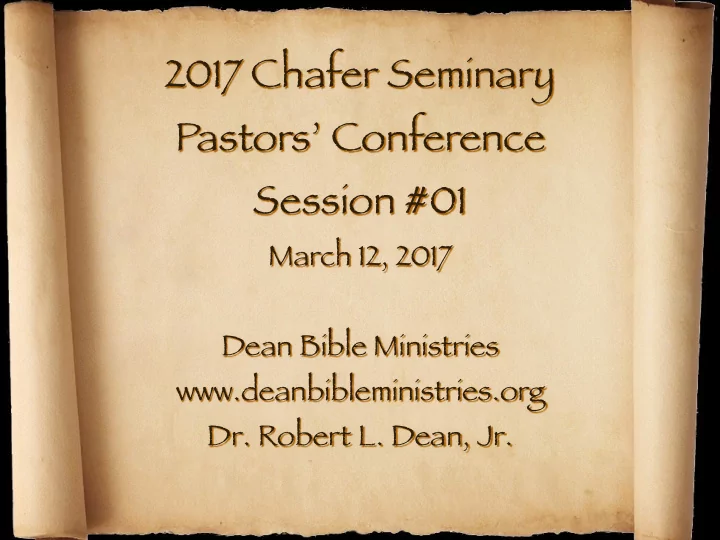
2017 Chafer Seminary Pastors Conference Session #01 March 12, 2017 - PowerPoint PPT Presentation
2017 Chafer Seminary Pastors Conference Session #01 March 12, 2017 Dean Bible Ministries www.deanbibleministries.org Dr. Robert L. Dean, Jr. Annual Pastors Conference March, 2017 Inerrancy and Interpretation Introduction: The Battle for the
2017 Chafer Seminary Pastors’ Conference Session #01 March 12, 2017 Dean Bible Ministries www.deanbibleministries.org Dr. Robert L. Dean, Jr.
Annual Pastors’ Conference March, 2017 Inerrancy and Interpretation Introduction: The Battle for the Bible
“The Bible is a phenomenon which is explainable in but one way—it is the Word of God. It is not such a book as man would write if he could, or could write if he would.” ~L. S. Chafer
“ … the theologian must be a Biblicist —one who is not only a Biblical scholar but also a believer in the divine character of each and every portion of the text of the Bible.” ~L. S. Chafer
“The student who in spite of the claims of the Bible to be the Word of God is yet groping for added light on that aspect of truth, cannot even begin the study of Systematic Theology.” ~L. S. Chafer
1. Definitions: What is “inerrancy?” and what is “interpretation”? 2. What do we believe about these things? 3. Why do we believe this? 4. Why these two topics and what is their connection? 5. What is the history of the “Battle for the Bible”? 6. What does the Bible claim for itself? 7. Implications for every one of us.
1. Definitions: What is “inerrancy?” and what is “interpretation”? 2. What do we believe about these things? ♦ Revelation. The written content of the Bible was revealed by God in order to unveil Himself and His eternal plan to mankind.
1. Definitions: What is “inerrancy?” and what is “interpretation”? 2. What do we believe about these things? ♦ Inspiration. Through inspiration, God moving holy men to write, the Lord made certain that His revelation about Himself was recorded without error in the original documents. Every facet of Scripture (including statements that regard science, history, and geography) is God breathed (2 Timothy 3:16–17; 2 Peter 1:20–21).
1. Definitions: What is “inerrancy?” and what is “interpretation”? 2. What do we believe about these things? ♦ Interpretation of Scripture. We believe in a normal (literal), grammatical, and historical interpretation of Scripture that affirms, for example, the belief that the opening chapters of Genesis present creation in seven literal, 24-hour days (Genesis 1:31; Exodus 31:17).
1. Definitions: What is “inerrancy?” and what is “interpretation”? 2. What do we believe about these things 3. Why do we believe this?
Biblical/Divine Authority Christian Belief INSPIRATION Y INERRANCY T I L I B I L L A F N I
1. We believe this because this is what the Bible teaches. 2. We do not believe this because of a prior commitment to a theological position. 3. We do not believe this because of a prior commitment to a denominational position. 4. We do not believe this because of a philosophical presupposition, i.e., the influence of Scottish Common Sense philosophy.
1. Definitions: What is “inerrancy?” and what is “interpretation”? 2. What do we believe about these things? 3. Why do we believe this? 4. Why these two topics and what is their connection?
1. Definitions: What is “inerrancy?” and what is “interpretation”? 2. What do we believe about these things? 3. Why do we believe this? 4. Why these two topics and what is their connection? 5. What is the history of the “Battle for the Bible”?
Descartes: “I think, therefore, I am” Nov 10, 1619 Man becomes the measure. Johann Semler, 1757, challenges verbal inspiration, introduces historical criticism . Nineteenth century German/Protestant liberalism. Late 19 th century: The fundamentalist-modernist controversy. 1960s–1970s— The Battle for the Bible, part 2 2000s— The Battle for the Bible, part 3
Historical Criticism 1. Believes the central error [of Christianity] is the interchangeable use of Scripture and the Word of God. 2. Presupposes the autonomy of man, man determines what the Word of God is. 3. It separates the Word of God from the Bible. 4. The higher critic begins with a presupposition that God cannot reveal Himself to man.
1. Definitions: What is “inerrancy?” and what is “interpretation”? 2. What do we believe about these things? 3. Why do we believe this? 4. Why these two topics and what is their connection? 5. What is the history of the “Battle for the Bible”? 6. What does the Bible claim for itself?
2 Tim. 3:15, “and that from childhood you have known the sacred writings which are able to give you the wisdom that leads to salvation through faith which is in Christ Jesus. 2 Tim. 3:16, “All Scripture is given by inspiration of God, and is profitable for doctrine, for reproof, for correction, for instruction in righteousness, 2 Tim. 3:17, “that the man of God may be complete, thoroughly equipped for every good work.”
2 Tim. 3:16, “All Scripture is given by inspiration of God, and is profitable for doctrine, for reproof, for correction, for instruction in righteousness, 2 Tim. 3:17, “that the man of God may be complete, thoroughly equipped for every good work.” qeo/pneustoß theopneustos nom fem sing (verbal) God-breathed
2 Pet. 1:20, “knowing this first, that no prophecy of Scripture is of any private interpretation, 2 Pet. 1:21, “for prophecy never came by the will of man, but holy men of God spoke as they were moved by the Holy Spirit.”
2 Pet. 1:20, “knowing this first, that no prophecy of Scripture is of any private interpretation, 2 Pet. 1:21, “for prophecy never came by the will of man, but holy men of God spoke as they were moved by the Holy Spirit.” prw ◊ toß proœtos first, prominent, foundational
2 Pet. 1:20, “knowing this first, that no prophecy of Scripture is of any private interpretation, 2 Pet. 1:21, “for prophecy never came by the will of man, but holy men of God spoke as they were moved by the Holy Spirit.” Literally: Every prophecy of Scripture does not come about from his own explanation/ interpretation.
2 Pet. 1:21, “for prophecy never came by the will of man, but holy men of God spoke as they were moved by the Holy Spirit.” fe÷rw pheroœ fe÷rw pheroœ aor pass indic 3 pres pass ptcp sing to bring, instrumental carry to bring, carry
2 Pet. 1:21, “for prophecy never came by the will of man, but holy men of God spoke as they were moved by the Holy Spirit.” fe÷rw pheroœ fe÷rw pheroœ aor pass indic 3 pres pass ptcp sing to bring, instrumental carry to bring, carry Acts 27:17, “When they had taken it on board, they used cables to undergird the ship; and fearing lest they should run aground on the Syrtis Sands, they struck sail and so were driven.”
“In this singularly precise and pregnant statement there are several things which require to be carefully observed. There is, first of all, the emphatic denial that prophecy—that is to say, on the hypothesis upon which we are working, Scripture—owes its origin to human initiative: ‘No prophecy ever was brought —“came” is the word used in the English Version text, with “was brought” in the Revised Version margin—by the will of man.’ ” 1851–1921 The Inspiration and Authority of the Bible
“Then, there is the equally emphatic assertion that its source lies in God: It was spoken by men, indeed, but the men who spoke it ‘spake from God.’ And a remarkable clause is here inserted, and thrown forward in the sentence that stress may fall on it, which tells us how it could be that men, in speaking, should speak not from themselves, but from God: it was ‘as borne’—it is the same word which was rendered ‘was brought’ above, and might possibly be rendered ‘brought’ here—‘by the Holy Spirit’ that they spoke. Speaking thus under the determining influence of the Holy Spirit, the things they spoke were not from themselves, but from God.”
Heb. 4:12, “For the word of God is living and powerful, and sharper than any two-edged sword, piercing even to the division of soul and spirit, and of joints and marrow, and is a discerner of the thoughts and intents of the heart.”
1 Tim. 5:18: Paul links Old Testament and New Testament verses and calls both Scripture. 1 Tim. 5:18, “For the Scripture says, ‘You shall not muzzle the ox while he is threshing,’ (Deut. 25:4) and ‘The laborer is worthy of his wages.’ ” quoted as Scripture from Luke 10:7.
Peter recognized Paul’s writings as Scripture: 2 Pet. 3:16, “as also in all his letters, speaking in them of these things, in which are some things hard to understand, which the untaught and unstable distort, as they do also the rest of the Scriptures, to their own destruction.”
1. God is absolute Veracity or Truth, Romans 3:4 Rom. 3:4, “May it never be! Rather, let God be found true, though every man be found a liar, as it is written, ‘That Thou mightest be justified in Thy words, and mightest prevail when Thou art judged.’ ” 2. God is the source of the Scriptures: 1 Tim. 3:16 3. Therefore, The Scriptures are absolute Truth. John 17:17 John 17:17, “Sanctify them in the truth; Thy word is truth.” 4. Rule: If the premises of a syllogism are correct then the conclusion must be correct.
Recommend
More recommend
Explore More Topics
Stay informed with curated content and fresh updates.
